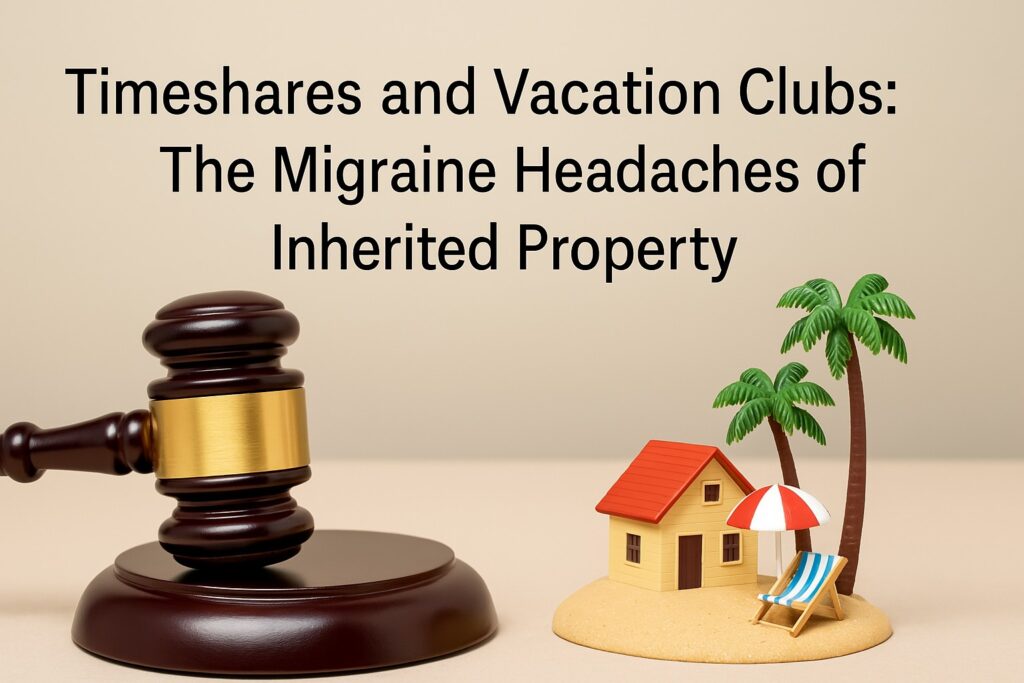Inheriting a Timeshare: Asset or Liability?
Timeshares are frequently marketed as affordable ways to own vacation properties. But what happens when a timeshare becomes part of your estate? Many heirs are surprised to discover that timeshares don’t function like traditional real estate. Instead of receiving a valuable investment, beneficiaries may inherit ongoing maintenance fees, restrictions on resale, and unexpected legal obligations.
Understanding the potential downsides of inheriting a timeshare can help heirs make informed decisions about whether to keep, sell, or disclaim the property. Inheriting a timeshare can be a mess.
Hidden Costs of Inheriting a Timeshare
Unlike typical real estate, timeshares often carry mandatory fees and restrictions, turning them into financial liabilities rather than valuable assets.
1. Ongoing Maintenance Fees
One major disadvantage of inheriting a timeshare is the obligation to pay ongoing maintenance fees, regardless of property usage. These fees:
- Increase annually, frequently surpassing inflation
- Can reach thousands of dollars per year
- Must be paid even if the property is unused
Failure to pay these fees can result in collection efforts, damaged credit, or foreclosure.
2. Difficulty Selling or Transferring Ownership
Selling an inherited timeshare is notoriously difficult. Unlike other properties, timeshares:
- Depreciate rapidly, often holding minimal market value
- Attract limited buyer interest, even in desirable locations
- May have restrictive contract clauses hindering resale or transfer
Heirs may spend considerable time and money attempting to sell an unwanted timeshare, only to remain responsible for ongoing costs after inheriting a timeshare.
3. Potential Legal Liabilities
If the inherited timeshare is deeded property, beneficiaries become legally responsible for related costs, potentially leading to:
- Legal action from management companies for unpaid fees
- Multiple heirs forced to share financial responsibilities under inheritance laws
- Contracts that bind heirs indefinitely, complicating the ability to exit
Even initially appealing timeshares can carry significant long-term obligations.
How Can You Avoid Inheriting a Timeshare?
1. Disclaiming the Inheritance
Heirs are not obligated to accept a timeshare. Beneficiaries can legally refuse (disclaim) ownership by filing the necessary documentation with the probate court before accepting any benefits or making payments. It’s critical to disclaim promptly, as using or paying fees can be interpreted as accepting ownership.
2. Negotiating a Deed-Back with the Resort
Some resorts offer deed-back programs, allowing heirs to return the timeshare directly. This process typically involves:
- Contacting the resort for eligibility criteria
- Completing paperwork to relinquish ownership
- Paying potential exit fees
However, not all resorts provide this option, and fees may apply.
3. Seeking Legal Assistance
If a resort refuses a deed-back, consulting with an estate planning attorney can reveal additional strategies after inheriting a timeshare, such as:
- Reviewing contracts for potential exit clauses
- Negotiating directly with the management company
- Exploring legal avenues to protect heirs from ongoing liabilities
Professional guidance can significantly reduce the burden of unwanted timeshare obligations.
Should You Ever Keep an Inherited Timeshare?
While most heirs prefer to avoid timeshare inheritances, certain situations may warrant keeping one. Consider retaining the timeshare if:
- The location is attractive and frequently used by your family
- Maintenance fees are reasonable compared to similar vacation costs
- The contract offers flexible terms for usage or future resale
Nevertheless, it’s essential to carefully assess long-term obligations before making a decision.
Protect Your Estate from Unwanted Timeshare Liabilities
If you or a loved one owns a timeshare, proactive estate planning can prevent heirs from inheriting unwanted financial burdens.
At the Law Offices of Robert J. Varak, we assist clients with planning for complex assets, negotiating timeshare exits, and protecting heirs from unnecessary liabilities. Schedule a consultation today with your Naperville estate planning lawyer to discuss your estate planning needs.
Key Takeaways
- Timeshares involve ongoing fees that must be paid regardless of usage.
- Selling or transferring a timeshare is often challenging due to limited demand and contract restrictions.
- Legal responsibilities for timeshare ownership can transfer to heirs, creating significant financial liabilities.
- Heirs can legally disclaim a timeshare inheritance if action is taken promptly.
- A Naperville estate planning attorney can provide valuable assistance navigating timeshare exits and inheritance disclaimers.
Source: Yahoo Finance (Aug. 16, 2024) “Inheriting a timeshare can be bad news. Here’s why, and how to avoid it”



